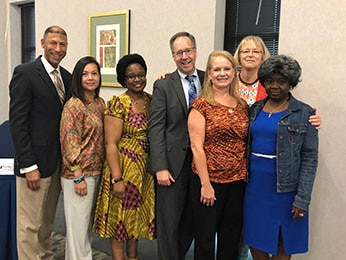2019
HRSA Plays a Leading Role in Ending the HIV Epidemic
The Health Resources and Services Administration (HRSA) is one of five federal agencies within the U.S. Department of Health & Human Services leading a new nationwide initiative to end the HIV epidemic by 2030. In 2019, the Administration announced the Ending the HIV Epidemic: A Plan for America initiative, which aims to reduce the number of new HIV infections by 75 percent within five years and by 90 percent by 2030. The initiative will focus efforts on 48 counties, Washington, D.C., and San Juan, Puerto Rico—areas where the majority of HIV diagnoses occurred in 2016 and 2017—and seven states with a substantial rural HIV burden: Alabama, Arkansas, Kentucky, Mississippi, Missouri, Oklahoma, and South Carolina.
HRSA will support the goals of the initiative through its Ryan White HIV/AIDS Program (RWHAP) and the HRSA-funded Health Center Program, which have a long history of delivering quality HIV care to the most at-risk populations. These programs will focus on four key strategies for ending the HIV epidemic in the United States:
- Diagnose all people with HIV as early as possible. HRSA’s Health Center Program will increase routine and risk-based HIV testing at its funded health centers in highly affected areas. These health centers also will partner with local community organizations to raise awareness and encourage more people to get tested.
- Treat people with HIV rapidly and effectively to reach sustained viral suppression. HRSA’s RWHAP will link people who received a new diagnosis of HIV and those who know their diagnosis but are not receiving care to the treatment and support services they need to reach and maintain an undetectable viral load. People with HIV who take their HIV medication daily as prescribed and reach and maintain an undetectable viral load cannot sexually transmit the virus to their partners.
- Prevent new HIV transmissions by using proven interventions, including pre-exposure prophylaxis (PrEP) and syringe services programs (SSPs). HRSA’s Health Center Program will expand access to PrEP by receiving referrals from community-based health programs and providing PrEP for patients in key geographic areas who are at highest risk for HIV. Using PrEP daily reduces the risk of getting HIV from sexual contact by more than 90 percent.
- Respond quickly to potential HIV outbreaks to get needed prevention and treatment services to people who need them. HRSA’s RWHAP and Health Center Program will use “cluster detection” to find places where HIV is spreading faster than expected. Cluster detection takes advantage of advances in health care databases, geographic information systems, and statistical analysis to identify HIV outbreaks. Where an outbreak is found, the RWHAP and the Health Center Program will coordinate with community partners to intervene rapidly to reach and treat infected individuals and to deliver preventive care, such as PrEP, to at-risk individuals.
Making Communities Part of the Solution
In 2019, HRSA leadership traveled across the country holding “listening sessions” with RWHAP recipients, Health Center Programs, state and county leaders, and HIV community partners in 21 cities in 16 different states. The topics discussed during these sessions included—
- Ways to actively involve community-based organizations, community health centers, people with HIV, and other new local stakeholders in ending the HIV epidemic in their areas
- Approaches to leveraging community strengths, such as hiring community health workers, peer navigators, and peer specialists
- Barriers to people with HIV receiving care, such as untreated mental illness, substance use, incarceration, homelessness, and poor access to transportation
- Supporting training for clinic staff to ensure that clients receive culturally responsive, supportive care (including testing and PrEP)
- Addressing stigma, health education, and criminalization laws
Other key themes included—
- Addressing workforce shortages of medical, mental health, and substance use care providers
- Assessing eligibility and intake processes for HIV testing and care
- Allowing jurisdictions to be innovative and adapt and learn as they go
HRSA will continue to hold listening sessions with grant recipients to learn about the programs they are implementing and ways to support those programs.
 Health Resources & Services Administration
Health Resources & Services Administration


